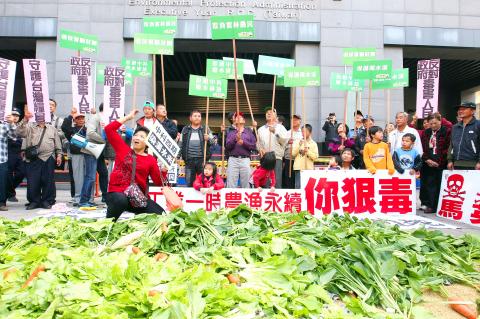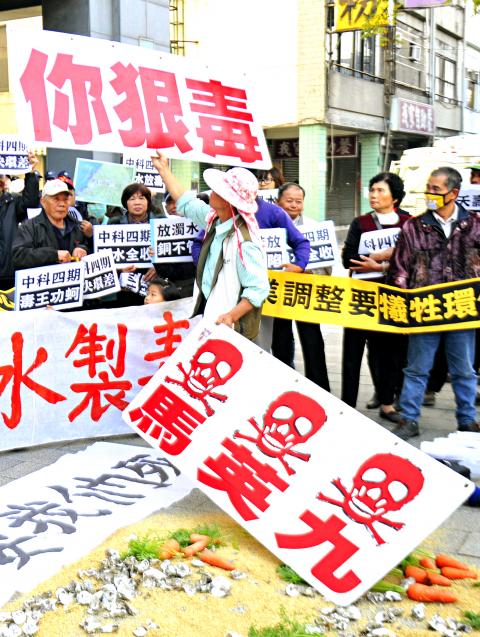|
Science park’s wastewater policy
protested
By Lee I-chia / Staff reporter

Farmers from Yunlin and Changhua
counties, joined by environmentalists and legislators, scatter vegetables and
other items on the ground and protest in front of the Environmental Protection
Administration in Taipei yesterday, calling for the Central Taiwan Science
Park’s fourth-phase expansion project to recycle all of its wastewater.
Photo: Chen Chih-chu, Taipei Times

Farmers from Yunlin and Changhua
counties, joined by environmentalists and legislators, scatter food on the
ground and protest in front of the Environmental Protection Administration in
Taipei yesterday, calling for the Central Taiwan Science Park’s fourth-phase
expansion project to recycle all of its wastewater.
Photo: CNA
Scattering carrots, grains, eggs and
oyster shells on the ground, about 100 farmers from Yunlin and Changhua counties
yesterday protested in front of the Environmental Protection Administration
(EPA) along with environmentalists and legislators, demand that the Central
Taiwan Science Park’s (CTSP) fourth-phase expansion project to be forced to
recycle all of its wastewater.
In 2009, the EPA approved an Environmental Impact Assessment (EIA) allowing the
park to discharge its industrial wastewater into either the new Jhuoshui River
(濁水溪) or the old Jhuoshui River,.
The Executive Yuan later promised that the wastewater from the park would be
discharged into the ocean to avoid pollution of nearby farms.
However, the park’s core industry was changed to precision machinery last year.
The revised project proposal submitted for EIA review still plans to discharge
wastewater into the new Jhuoshui River, invoking concern from local farmers, who
urged the park to recycle all of its wastewater.
Before the EIA general assembly started the review of the project yesterday,
protesters rallied in front of the building, holding banners that read: “CTSP’s
fourth-phase expansion project is polluting the Jhuoshui River with toxic
wastewater,” “Reject the project,” “Complete wastewater recycle,” “Sacrificing
environment for industrial adjustment” and other hand-held signs in front of the
EPA.
Changhua Environmental Protection Union secretary-general Shih Yueh-ying (施月英)
said the pipes that are to discharge wastewater near the Tzichiang Bridge (自強大橋)
were exactly where land subsidence is at a critical level, which would likely
cause the pipes to burst and contaminate nearby farms.
The farmers also expressed concern that the wastewater discharged into the river
would contaminate their crops and fish farms or the groundwater, and asked the
companies to guarantee that 100 percent wastewater would be recycled.
Participating in the EIA meeting was Democratic Progressive Party (DPP)
Legislator Tien Chiu-chin (田秋堇), who said that environmental regulations should
not be loosened for companies, thereby sacrificing the farmers and the
environment.
DPP Legislator Liu Chien-kuo (劉建國) said that “the Jhuoshui River is the mother
river of Taiwan” and should not be harmed by wastewater from the park.
Conflicts also arose between local governmental officials, as Changhua County
Deputy Commissioner Patrick Lin (林田富) expressed the need for a science park to
counter the outflow of young people from the county.
He said that the park’s wastewater would not harm local residents.
However, Yunlin County Deputy Commissioner Shih Keh-he (施克和) expressed concern
that during dry seasons, wastewater would not be adequately diluted in the
river.
The meeting continued until about 5pm. The EIA general assembly approved the
revised proposal, as well as eight revised items that differ from the previous
assessment.
After the meeting, several civic groups said they were disappointed about the
EIA’s conclusion.
At the National Science Council (NSC), council Deputy Director-General Hocheng
Hong (賀陳弘) said he was glad the EIA process had finally come to an end and that
the companies are likely to be more confident in applying to establish plants in
the park.
He said that if I-Ming Sanitary Materials Co — the only company that has
finished building its plant in the park — could fulfill the requirements
regarding the recycling of its wastewater and was approved by the park
administration, the company could begin operations this year.
However, the basic infrastructure of the park might not be completed for another
two to three years, Hochen said, adding that many companies have already
expressed interest in building plants in the park.
Responding to how the council would deal with opposing voices, Hochen said:
“Communication is a never ending thing. The council will continue to communicate
with the people with concerns.”
“However, from my experience of EIA meetings, I believe that many of these
people are not fully informed and become emotional when expressing their
feelings, instead of discussing facts rationally.”
A workforce will also be established to monitor whether the park’s operations
conform to the EIA, with one-third of the members to come a from third party,
one-third from the park administration and one-third from local residents, he
added.
|
![]()
![]()
![]()